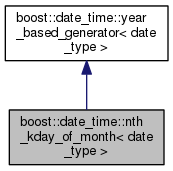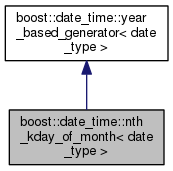Useful generator functor for finding holidays. More...
#include <date_generators.hpp>


Public Types | |
| enum | week_num { first =1, second, third, fourth, fifth } |
| typedef date_type::calendar_type | calendar_type |
| typedef calendar_type::day_of_week_type | day_of_week_type |
| typedef calendar_type::month_type | month_type |
| typedef calendar_type::year_type | year_type |
| typedef date_type::duration_type | duration_type |
Public Member Functions | |
| nth_kday_of_month (week_num week_no, day_of_week_type dow, month_type m) | |
| date_type | get_date (year_type y) const |
| Return a concrete date when provided with a year specific year. More... | |
| month_type | month () const |
| week_num | nth_week () const |
| day_of_week_type | day_of_week () const |
| const char * | nth_week_as_str () const |
| virtual std::string | to_string () const |
| Returns string suitable for use in POSIX time zone string. More... | |
Useful generator functor for finding holidays.
Based on the idea in Cal. Calc. for finding holidays that are the 'first Monday of September'. When instantiated with 'fifth' kday of month, the result will be the last kday of month which can be the fourth or fifth depending on the structure of the month.
The algorithm here basically guesses for the first day of the month. Then finds the first day of the correct type. That is, if the first of the month is a Tuesday and it needs Wenesday then we simply increment by a day and then we can add the length of a week until we get to the 'nth kday'. There are probably more efficient algorithms based on using a mod 7, but this one works reasonably well for basic applications.
| typedef date_type::calendar_type boost::date_time::nth_kday_of_month< date_type >::calendar_type |
| typedef calendar_type::day_of_week_type boost::date_time::nth_kday_of_month< date_type >::day_of_week_type |
| typedef date_type::duration_type boost::date_time::nth_kday_of_month< date_type >::duration_type |
| typedef calendar_type::month_type boost::date_time::nth_kday_of_month< date_type >::month_type |
| typedef calendar_type::year_type boost::date_time::nth_kday_of_month< date_type >::year_type |
| enum boost::date_time::nth_kday_of_month::week_num |
|
inline |
|
inline |
|
inlinevirtual |
Return a concrete date when provided with a year specific year.
Implements boost::date_time::year_based_generator< date_type >.
References boost::date_time::week.
Referenced by boost::date_time::us_dst_trait< date_type >::local_dst_start_day(), and boost::date_time::us_dst_rules< date_type_, time_duration_type_, dst_start_offset_minutes, dst_length_minutes >::local_dst_start_day().
|
inline |
|
inline |
|
inline |
References boost::date_time::nth_as_str().
|
inlinevirtual |
Returns string suitable for use in POSIX time zone string.
Returns a string formatted as "M4.3.0" ==> 3rd Sunday in April.
Implements boost::date_time::year_based_generator< date_type >.